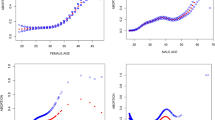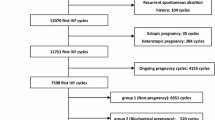Abstract
Purpose
This study aimed to investigate the factors that predict successful pregnancy (live birth) in assisted reproductive technology (ART) for infertile women aged 40 and older.
Methods
Patients who underwent first ART treatments at the age of 40 and older at our institution were enrolled. Several factors which can be evaluated before the first treatments were retrospectively compared among those patients who did and did not achieve live birth.
Results
Nineteen of 119 patients delivered healthy babies. There was no significant difference of live-birth rate among age groups of 40, 41 and 42. No women who underwent the first treatment at age 43 or older achieved live birth. In the successful group, significantly more women held FSH levels under 12 mIU/ml and had regular menstrual cycles (26–32 days) than unsuccessful women of the same age group. In addition, significantly fewer women in the successful group had prior ovarian surgery.
Conclusions
Our results show that low FSH levels, regular menstrual cycles and absence of prior ovarian surgery were related to high live-birth rates and they are good prognostic factors in patients between 40 and 42 years of age. On the other hand, none of these parameters were correlated with success in women aged 43 and older.
Similar content being viewed by others
References
Devroey P, Godoy H, Smitz J, et al. Female age predicts embryonic implantation after ICSI: a case-controlled study. Hum Reprod. 1996;11:1324–7.
van Kooij RJ, Looman CW, Habbema JD, Dorland M, te Velde ER. Age-dependent decrease in embryo implantation rate after in vitro fertilization. Fertil Steril. 1996;66:769–75.
Spandorfer SD, Chung PH. An analysis of the effect of age on implantation rates. J Assist Reprod Genet. 2000;17:303–6.
Lass A, Croucher C, Duffy S, Dawson K, Margara R, Winston RM. One thousand initiated cycles of in vitro fertilization in women > or = 40 years of age. Fertil Steril. 1998;70:1030–4.
Grimbizis G, Vandervorst M, Camus M, Tournaye H, Van Steirteghem A, Devroey P. Intracytoplasmic sperm injection, results in women older than 39, according to age and the number of embryos replaced in selective or non-selective transfers. Hum Reprod. 1998;13:884–9.
Spandorfer SD, Bendikson K, Dragisic K, Schattman G, Davis OK, Rosenwaks Z. Outcome of in vitro fertilization in women 45 years and older who use autologous oocytes. Fertil Steril. 2007;87:74–6.
Klipstein S, Regan M, Ryley DA, Goldman MB, Alper MM, Reindollar RH. One last chance for pregnancy: a review of 2,705 in vitro fertilization cycles initiated in women age 40 years and above. Fertil Steril. 2005;84:435–45.
Tsafrir A, Simon A, Revel A, Reubinoff B, Lewin A, Laufer N. Retrospective analysis of 1217 IVF cycles in women aged 40 years and older. Reprod Biomed Online. 2007;14:348–55.
Ron-El R, Raziel A, Strassburger D, Schachter M, Kasterstein E, Friedler S. Outcome of assisted reproductive technology in women over the age of 41. Fertil Steril. 2000;74:471–5.
Sherman BM, Korenman SG. Hormonal characteristics of the human menstrual cycle throughout reproductive life. J Clin Invest. 1975;55:699–706.
Whelan EA, Sandler DP, McConnaughey DR, Weinberg CR. Menstrual and reproductive characteristics and age at natural menopause. Am J Epidemiol. 1990;131:625–32.
Brodin T, Bergh T, Berglund L, Hadziosmanovic N, Holte J. Menstrual cycle length is an age-independent marker of female fertility: results from 6271 treatment cycles of in vitro fertilization. Fertil Steril. 2008;90:1656–61.
Guerneri S, Bettio D, Simoni G, Brambati B, Lanzani A, Fraccaro M. Prevalence and distribution of chromosome abnormalities in a sample of first trimester internal abortions. Hum Reprod. 1987;2:735–9.
Ljunger E, Cnattingius S, Lundin C, Annerén G. Chromosomal anomalies in first-trimester miscarriages. Acta Obstet Gynecol Scand. 2005;84:1103–7.
Author information
Authors and Affiliations
Corresponding author
About this article
Cite this article
Fujimoto, A., Fujiwara, T., Oishi, H. et al. Predictive factors of successful pregnancy after assisted reproductive technology in women aged 40 years and older. Reprod Med Biol 8, 145–149 (2009). https://doi.org/10.1007/s12522-009-0023-z
Received:
Accepted:
Published:
Issue Date:
DOI: https://doi.org/10.1007/s12522-009-0023-z




